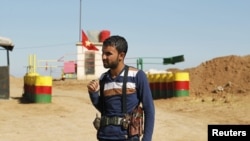DOMIZ, IRAQ —
Tens of thousands of Kurdish refugees have crossed the border into Iraqi Kurdistan to flee the violence in Syria. Meanwhile, the Kurdistan Regional Government in Iraq is training fighters to cross into Syria, to defend territory now held by Kurds.
On a vast desert plain, with the Kurdistan mountains in the distance, lies the Domiz refugee camp, close to Iraq’s border with Syria.
A crowd of new arrivals, dozens deep, fights to register at the head office - the first step towards longer-term settlement in the northern Iraqi region of Kurdistan. Around 250 people arrive here every day.
Sadulah Abdullah Hamid is refugee coordinator at the camp. “Our door is open," Hamid says. "Whoever comes, we will welcome them and try our best to look after them and give them what they need.”
It is that perceived kinship between Kurds that has attracted many of the refugees here to Kurdistan, rather than to Turkey, Lebanon or Jordan.
While the Kurds control a large part of eastern Syria, there are big Kurdish populations in cities like Damascus and Aleppo, and the violence there has forced them to flee.
The conflict has galvanized the Kurdish drive for self-determination. Many of the young men in the camp want to return and fight for the Kurdish cause.
Twenty-four-year-old Hawar Ahmed says everyone wants to go to fight against Assad but can’t get back into Syria. He says many men here want to go to become Peshmerga [Kurdish fighters].
His friend Abdul Al-Jafri says he is a Kurdish man and will die one day anyway. So he wants to fight and die for Kurdistan and wants the Kurdish part of Syria and Iraqi Kurdistan to unite together.
Hemin Hawrami of Iraqi Kurdistan’s ruling Kurdistan Democratic Party says his government has been giving military training to Syrian Kurds to help solidify recent territorial gains in Syria.
“We want these people to be responsible for defending their own areas, for protecting governmental buildings for example, to prevent the spill over of looters or civil war or things like that. But this is the only purpose - we have not trained them to attack,” he said.
Local media report thousands of trained Kurdish fighters are waiting on the Syrian border, but that the party that controls Kurdish parts of Syria, the PYD, will not allow them in.
The PYD has yet to join the Kurdish National Council, the umbrella body founded last year in Erbil. Hemin Hawrami says they should join.
“It’s very important to keep the unity of the Kurds because it’s the key for the changes in Syria. And also for the unity of the opposition,” he said.
Historic rivalries and conflicts will have to be overcome if Kurdish factions are to unite.
In the meantime, in Domiz camp, there are more immediate concerns for the Kurds forced to flee Syria.
On a vast desert plain, with the Kurdistan mountains in the distance, lies the Domiz refugee camp, close to Iraq’s border with Syria.
A crowd of new arrivals, dozens deep, fights to register at the head office - the first step towards longer-term settlement in the northern Iraqi region of Kurdistan. Around 250 people arrive here every day.
Sadulah Abdullah Hamid is refugee coordinator at the camp. “Our door is open," Hamid says. "Whoever comes, we will welcome them and try our best to look after them and give them what they need.”
It is that perceived kinship between Kurds that has attracted many of the refugees here to Kurdistan, rather than to Turkey, Lebanon or Jordan.
While the Kurds control a large part of eastern Syria, there are big Kurdish populations in cities like Damascus and Aleppo, and the violence there has forced them to flee.
The conflict has galvanized the Kurdish drive for self-determination. Many of the young men in the camp want to return and fight for the Kurdish cause.
Twenty-four-year-old Hawar Ahmed says everyone wants to go to fight against Assad but can’t get back into Syria. He says many men here want to go to become Peshmerga [Kurdish fighters].
His friend Abdul Al-Jafri says he is a Kurdish man and will die one day anyway. So he wants to fight and die for Kurdistan and wants the Kurdish part of Syria and Iraqi Kurdistan to unite together.
Hemin Hawrami of Iraqi Kurdistan’s ruling Kurdistan Democratic Party says his government has been giving military training to Syrian Kurds to help solidify recent territorial gains in Syria.
“We want these people to be responsible for defending their own areas, for protecting governmental buildings for example, to prevent the spill over of looters or civil war or things like that. But this is the only purpose - we have not trained them to attack,” he said.
Local media report thousands of trained Kurdish fighters are waiting on the Syrian border, but that the party that controls Kurdish parts of Syria, the PYD, will not allow them in.
The PYD has yet to join the Kurdish National Council, the umbrella body founded last year in Erbil. Hemin Hawrami says they should join.
“It’s very important to keep the unity of the Kurds because it’s the key for the changes in Syria. And also for the unity of the opposition,” he said.
Historic rivalries and conflicts will have to be overcome if Kurdish factions are to unite.
In the meantime, in Domiz camp, there are more immediate concerns for the Kurds forced to flee Syria.















